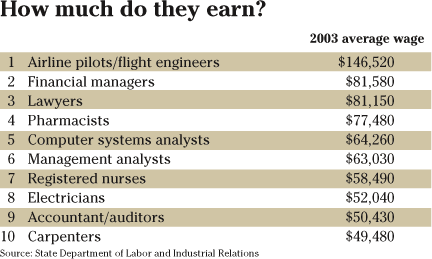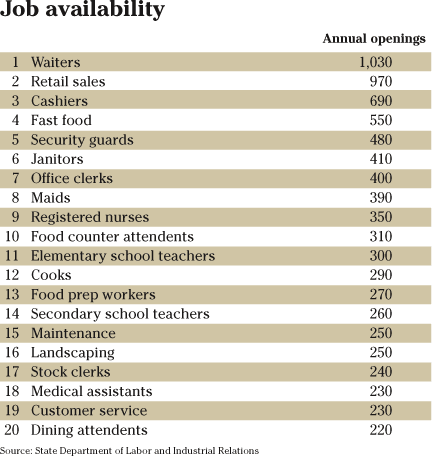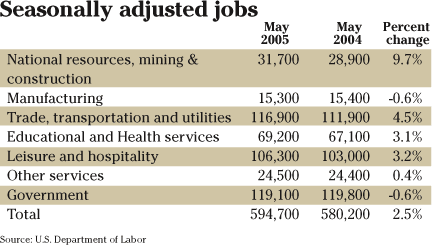|

|
Employers devise
hiring incentives
Higher wages and more benefits
are used to attract workers
Keith Mylett, a 27-year-old Aiea Intermediate School teacher, is about to pick up a second job.
Mylett, who worked as a waiter before graduating from the University of Hawaii and becoming a teacher, said the cost of living has forced him to talk with his former employer, Monsarrat restaurant Tavola, Tavola, about returning to work part time.
|
|
Oahu's record-low 2.7 percent unemployment rate has not benefited Mylett, who said he's struggling to pay the $1,100-a-month rent on his Diamond Head condo. While the state's tight labor market might translate into better pay and benefits for some, Mylett hasn't gotten a leg up, nor have most of his friends, he said.
"People are still hanging on to their multiple jobs or going back to school," Mylett said. "It's discouraging."
Still, there are opportunities for employees to benefit from the tightening labor market as companies invent new ways to cope with the difficulty of finding workers. The fallout of a tight labor market for businesses results in increased recruitment, training and retention costs, which motivates creativity in the workplace, said Judy Bishop, manager of the employment agency CTA Staffing.
"There has only been visible evidence of a tightening market for a few months now, although unemployment rates have been low for some time," Bishop said. "It takes a while for a growing economy and an eroding work force to impact each and every company."
Companies across the state have started to offer a range of benefits from better health care and retirement plans to referral and recruitment bonuses, paid college tuition, store discounts and flexible hours, Bishop said.
"In the current environment, we have to make sure that we offer competitive wages and incentive opportunities," said Dailyn Yanagida-Ishii, vice president of human resources at Waikiki Trader Corp.
"Every Waikiki retailer is looking for someone who is willing to work flexible hours and is bilingual," Yanagida-Ishii said. "Recruiting is only half the battle. Retention is a whole other issue."

Norwegian Cruise Line lost 50 percent of its employees to other service and hospitality jobs in its early days in Hawaii.
"We're more willing to take a chance on hiring someone that doesn't have a lot of experience, but has a good attitude and can be trained," Yanagida-Ishii said.
The company is also more likely to hire year-round rather than seasonally, she said.
"When we come across a strong applicant, we hire them," Yanagida-Ishii said. "We can't afford to let good applicants fall back into a pool that large."
Perhaps no other company in Hawaii knows the high cost of employee turnover better than Norwegian Cruise Line. In the early days of its Hawaii operation, the company lost 50 percent of its employees to service-sector and hospitality competitors, said Robert Kritzman, executive vice president and managing director of Hawaii operations for NCL America, a subsidiary of Norwegian.
While Norwegian was able to pull about 60 percent of the staff for its Pride of Aloha ship from the islands, that number has dropped to about 40 percent for their second ship, Pride of America, which makes its debut in Hawaii next month, Kritzman said.
"Our hiring pool is getting smaller and smaller due to diminishing returns in this tight labor market," he said. As a result the company has spread its net wider by stepping up off-island recruitment and hiring less experienced workers.
Norwegian also has expanded its training program to three weeks and is launching an employee college fund, which is designed to appeal to the company's increasingly young work force, he said.
While Hawaii's tight labor market has benefited some employees in terms of pay and benefits, others have paid increased personal costs, said Bev Harbin, president of the Employers' Chamber of Commerce.
When companies can't hire qualified people fast enough, there is increased risk that those holding jobs in those businesses will be forced to work longer hours or perform tasks that they have not been properly trained for, Harbin said.
"They stretch the employees that they have and take risks to get things accomplished, which can result in increased safety and workers' comp costs," she said.
And while businesses might take more chances on hires in a tight labor market, they will expect more out of them when the stakes are higher, Harbin said.
"Corporations are still what they are. They aren't people huggers; they have to report to boards and stockholders," she said. "Even in a tight market, they want to cherry-pick and invest only in those that they believe have the potential to grow."



Tonight on KITV 4 News at 10 ...
E-mail to City Desk
[News] [Business] [Features] [Sports] [Editorial] [Do It Electric!]
[Classified Ads] [Search] [Subscribe] [Info] [Letter to Editor]
[Feedback]


